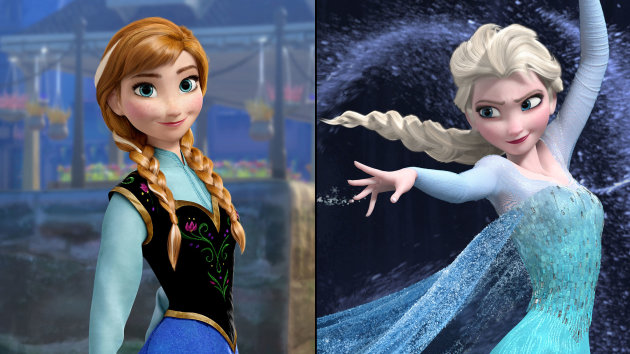--SPOILER WARNING--
This post is going to have spoilerific discussion of film facts that
might be better left to those who have either seen the film, or don’t care if
they know how it ends. That’s all I’ll say on the matter. Scroll down under
your own advisement and with consideration for my warning.
I put a question mark after the term “love story” on purpose with
regards to this movie. Love is certainly an element in “Frozen,” but romantic
love is, at the very best, irrelevant to the plot finale. The love story that
does matter is more about love between two sisters, and I believe that the
development of that relationship was overshadowed by the insignificant story of
romance.
Part of the marketing for the film centered on the two potential love
interests for the “main character,” Anna. One trailer illustrated this debate, one which Anna was ostensibly obliged to
make. The nice guy, Prince Hans, was contrasted with Kristoff, the ice
merchant; both of these men were contrasted with the potential scenario in
which Anna saves the day without having to rely on a man for support. As
mentioned in a previous post, this was part of a pseudo-female-empowerment
plan. For this plan to be real, she would have had to actually save the day on
her own. In some manner of speaking this is somewhat true, but more on that
later.
Hans was proven to be a manipulative villain who intended to leave Anna
for dead so that he could rule the kingdom by claiming to have married her and
become a de facto king. This leaves Kristoff and no one as the advertised
options for Anna’s affection. Ultimately it is made clear that Anna and
Kristoff do become a couple, but, unlike the vast majority of Disney films,
this love story doesn’t save lives, break a curse, nor even alter a law.
The love that does save the day (breaking one curse, and inspiring the
epiphany that ends an eternal winter) comes in the form of Anna’s personal
sacrifice to save her sister. To be perfectly honest, I think this
demonstration of love as the saving grace of the story is lessened in impact by
the fact that Anna still has to end up with a man. Even though she proved that
her sacrificial act of love could save herself, she can’t spend any more of her
fulfilled without a man.
Although there was an attempt to make Kristoff noble and sacrificing, it
was forced and ultimately solved no problems. There is a moment when he rides
across snow-covered hills, carrying Anna in his arms, so that she can kiss her
“true love.” The moment that rings untrue is when he delivers her to the castle
gates, dismounts, and leaves her in the company of servants, with hardly any
indication of the severity of the situation. He then leaves the castle,
dejected, trusting that her life will be saved, but not caring to make sure.
His leaving without completing his mission to save her life seems to be a
contrivance to facilitate increased drama ten minutes later into the film when
his reindeer convinces him that it is he, Kristoff, who is Anna’s true love.
That contrived moment of Kristoff not crossing the threshold into the castle
took me out of the film entirely.
Now, all of this falls beside the point that I think the love stories
were grossly confused in their conclusions. Kristoff ought to have been in love
with the older sister, Elsa, in my opinion. Anna might have done better without
a final love interest. But then again, perhaps it would have been best if she
ended up with the snowman, Olaf. They seem suited to each other in my eyes.
(Also there was a sequence when Olaf demonstrated his love as he risked melting
to try and save Anna).
The romance between Else and Kristoff was my hope while watching the
film the first time, and has persisted since. This is in part derived from my
notion that Else should have been the main character, or at least significantly
more featured, and in part from the connection between Kristoff and ice that is
more significant than any connection I noted between him and Anna. Kristoff’s
affinity for ice, and appreciating the beauty of it would have complimented
Elsa’s powers. Had Disney gone for a focus on Else and a love story along the
lines of their previous films, I’m sure Kristoff would have been the one to
show appreciation for Elsa’s powers and changed her ways. He could have seen and described the
beauty and the danger (along the lines of the first song, featuring the ice
cutters and a young Kristoff) of what she could do. He also would have been the
only character to show no fear for what she could do. In short, I think Disney’s
effort to give sense of girl-power and love-other-than-romantic shot them in
the foot and prevented them from telling a love story to rival their best ones.
Now, that love story might have mirrored “Beauty and the Beast” too closely for
some people’s tastes, but that is a classic film and one of Disney’s best. And
they could do worse than parallel that story more than 20 years later.
